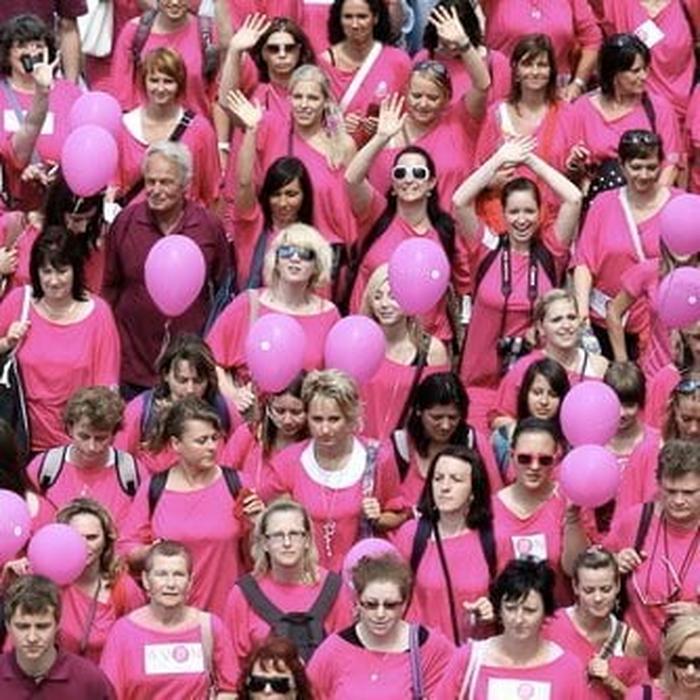
This has been a dramatic year for breast cancer. From the Komen debacle that kicked off the year to the more recent social media uproar against pinkwashing, a lot has been thrown into question about the ways that we go about fighting this horrible disease.
In light of all of this I—like many others—have been left wondering what I can really do to help the cause. So, with the help of Stef Woods—a DC-based breast cancer survivor and activist, also known as City Girl Blogs—I got in touch with eight other survivors and activists to get their opinions on what it means to take action against breast cancer, and what we can really do to make a difference.
Decide What You’re Fighting For
Taking action against breast cancer means different things to different people, but one thing is for sure: It involves “actually doing something that’s more than nebulous awareness,” Woods explains. “There was a time when people weren't aware and breast cancer wasn't talked about. That's not the case anymore, though. Action involves more than just talking about breast cancer.”
Beyond that, though, there are a range of areas within the breast cancer field that could use our support, and it’s really up to you to decide which one fuels your fire.
Directly supporting research is certainly one way you can focus your energies. Breast cancer is, after all, a disease—and the more scientists understand it, the more they can develop better prevention and treatment methods and, perhaps, even a cure.
A less commonly thought of—but just as important—way to help is by supporting patients and their families. Susan W. Bisbee, a licensed acupuncturist who helps patients deal with the side effects of cancer treatments, reminds us that cancer is a financially and emotionally devastating disease, so it’s important to help women, men, and their families cope.
Finally, education of good breast health is an important replacement to vague awareness. “[Taking action] means taking the time to check your own breasts, having proper screenings, and being unafraid or unashamed of having conversations about breast health with others. It means cultivating a sensitivity about breast cancer,” says Nicole McLean, a survivor, activist, and blogger.
Find the Right Organizations
When it comes to giving your money, buying pink products in October is simply not enough. If you’re looking to donate to the cause, your best bet is to find an organization that does something meaningful with your green, rather than one that focuses on making everything pink. McLean explains: “If you are more concerned with being effective with your donations (versus feeling good that you did something with minimal effort), you will take a few extra steps to research where your dollars are going and whether or not they will actually help someone with breast cancer.”
There are several steps you can take to evaluate an organization. AnneMarie Ciccarella—a breast cancer fighter, activist, and blogger—explains that her first step is always to read the mission statement of a non-profit she is considering working with. “Make sure it is doing something you believe in. Just because an organization receives a great rating on a charity navigator site does not mean it is doing the right thing with your donations.” Also pay attention to the language used by the organization: If it trivializes the disease through too much pinkwashing or "boobie" language, or blame patients for their illness or death in any way, it’s probably not the best organization to support.
Once you determine if an organization’s mission aligns with your own, make sure it stands behind its word. You want to find out where exactly, the money raised is going, how much is pulled out for administrative costs, and what the results of past research grants are. A little online research can be a great place to start. Woods suggests sources such as GuideStar, Philanthropy, and Charity Navigator as good starting point for finding out the real scoop about an organization. Then go to the organization’s website and look for detailed financial information and a breakdown of how it spends its money. If the website doesn’t indicate those things, email to get out more information before make a donation. Lisa, a breast cancer survivor, also suggests getting in touch with former donors and talking to them about their experience with the organization.
Need a place to start? The ladies I talked to felt good about supporting the Breast Cancer Research Foundation, Dr. Susan Love Research Foundation, METAvivor, and Angie’s Spa.
McLean also reminds us not to forget about local organizations. “I don't have a problem with the large national charities, but I want to maximize my impact, so local speaks to my heart more.” For both her and Woods, that means supporting the Capital Breast Care Center.
There’s More to Give Than Money
If you don’t have the funds—or don’t feel comfortable writing a check to any organization—there are still plenty of ways you can support the cause.
If you’re interested in furthering research, Ciccarella suggests enrolling in the Army of Women or The Health of Women Study, both online initiatives aimed at helping cancer researchers out by enrolling women in online surveys or clinical studies.
If you’d like to support people currently dealing with the disease, donate your time instead of your money. Be it a neighbor, close friend, or distant connection, McLean reminds us that “food, help with transportation to treatment, gifts of service (helping to clean or babysit), and such are more valuable than most people realize.” You can also volunteer at cancer centers or hospitals, or donate your skills to a non-profit in your area.
And, if you’re interested in furthering education of breast health, make sure you’re taking care of yourself first. Perform regular self-exams and get annual mammograms after the age of 40 (35 if you have a family history). Then, don’t be afraid to talk to your friends and loved ones about their breast health to make sure they’re doing the same thing.